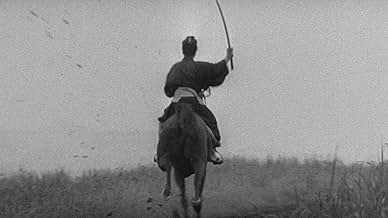IMDb रेटिंग
7.5/10
3.2 हज़ार
आपकी रेटिंग
अपनी भाषा में प्लॉट जोड़ेंAfter killing a counselor of his clan, a fugitive samurai befriends a couple poaching the shogun's gold in the mountains.After killing a counselor of his clan, a fugitive samurai befriends a couple poaching the shogun's gold in the mountains.After killing a counselor of his clan, a fugitive samurai befriends a couple poaching the shogun's gold in the mountains.
कहानी
क्या आपको पता है
- ट्रिवियाThis film is part of the Criterion Collection, spine #311.
- भाव
Minister: Wait! We're not connected at all. Why kill me?
Yuuki Gennosuke: No, we *are* connected because I'll see you in hell.
- कनेक्शनFeatured in Best in Action: 1965 (2021)
फीचर्ड रिव्यू
On the surface this may seem like a typical samurai action flick but like Kurosawa and Kobyashi films there are many social implications beneath the surface.
The movie seems to revolve around the irony that while Gennosuke, the main character who is basically cast out of society in to the wild and forced to constantly fight for his survival like an animal, is actually the only character that tries to show any qualities above that of a beast.
Every other character from a group of bandits he encounters to the group of clansmen trying to exact revenge after Gennosuke killed their leader, to a man and his wife from a separate clan trying to steal gold to improve their clan status are either acting for revenge, power, or greed. The greed exists because most of the movie takes place around a mountain where gold has just been discovered and Gennosuke is befriended by a poor man hoping to find some for himself.
Throughout the movie there is constant backstabbing, deception, and generally brutal acts committed by a multitude of these characters. For instance the man from a separate clan living with his wife on a shack by the river are attacked by bandits in the woods trying to steal the gold they have already mined; they hold the wife hostage in demand for his booty but the man would rather give up his wife then part with his gold. Her saving grace is when Gennosuke shows up on the the scene and acts with the courage and compassion to save her life. The husband does come around a little later in the movie but in the end his rival clan plans to kill everyone on the mountain and save the gold for themselves threatening the couple, Gennosuke, and his persuers.
Gosha does a great job with his imagery, demonstrating a wild, dark world threatening to swallow humans whole. Throughout the film, which is almost all outdoors are scenes of men disappearing into woods or buried beneath shrubbery. In fact, it's quite reminiscent of another Japanese Classic, Rashamon. Some of the shots are virtually identical, ie the sun being concealed over the forest canopy or disappearing behind a mountain.
One of the best touches is towards the end when soldiers from the rival clan are planning to take the mountain, and kill anyone who knows about the gold. One of them sounds a battle horn to signal the approach, a battle horn made to sound conspicuously like some kind of strange animal call.
The movie seems to revolve around the irony that while Gennosuke, the main character who is basically cast out of society in to the wild and forced to constantly fight for his survival like an animal, is actually the only character that tries to show any qualities above that of a beast.
Every other character from a group of bandits he encounters to the group of clansmen trying to exact revenge after Gennosuke killed their leader, to a man and his wife from a separate clan trying to steal gold to improve their clan status are either acting for revenge, power, or greed. The greed exists because most of the movie takes place around a mountain where gold has just been discovered and Gennosuke is befriended by a poor man hoping to find some for himself.
Throughout the movie there is constant backstabbing, deception, and generally brutal acts committed by a multitude of these characters. For instance the man from a separate clan living with his wife on a shack by the river are attacked by bandits in the woods trying to steal the gold they have already mined; they hold the wife hostage in demand for his booty but the man would rather give up his wife then part with his gold. Her saving grace is when Gennosuke shows up on the the scene and acts with the courage and compassion to save her life. The husband does come around a little later in the movie but in the end his rival clan plans to kill everyone on the mountain and save the gold for themselves threatening the couple, Gennosuke, and his persuers.
Gosha does a great job with his imagery, demonstrating a wild, dark world threatening to swallow humans whole. Throughout the film, which is almost all outdoors are scenes of men disappearing into woods or buried beneath shrubbery. In fact, it's quite reminiscent of another Japanese Classic, Rashamon. Some of the shots are virtually identical, ie the sun being concealed over the forest canopy or disappearing behind a mountain.
One of the best touches is towards the end when soldiers from the rival clan are planning to take the mountain, and kill anyone who knows about the gold. One of them sounds a battle horn to signal the approach, a battle horn made to sound conspicuously like some kind of strange animal call.
टॉप पसंद
रेटिंग देने के लिए साइन-इन करें और वैयक्तिकृत सुझावों के लिए वॉचलिस्ट करें
- How long is Sword of the Beast?Alexa द्वारा संचालित
विवरण
- चलने की अवधि1 घंटा 25 मिनट
- रंग
- ध्वनि मिश्रण
- पक्ष अनुपात
- 2.35 : 1
इस पेज में योगदान दें
किसी बदलाव का सुझाव दें या अनुपलब्ध कॉन्टेंट जोड़ें



























